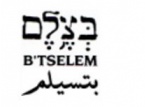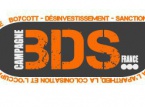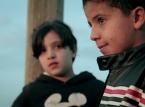Tags (4) : Gaza
B'TSELEM - The Israeli Information Center for Human Rights in the Occupied Territories was established in February 1989 by a group of prominent academics, attorneys, journalists, and Knesset members. It endeavors to document and educate the Israeli public and policymakers about human rights violations in the Occupied Territories, combat the phenomenon of denial prevalent among the Israeli public, and help create a human rights culture in Israel.
B'Tselem in Hebrew literally means "in the image of," and is also used as a synonym for human dignity. The word is taken from Genesis 1:27 "And God created humans in his image. In the image of God did He create him." It is in this spirit that the first article of the Universal Declaration of Human Rights states that "All human beings are born equal in dignity and rights."
As an Israeli human rights organization, B'Tselem acts primarily to change Israeli policy in the Occupied Territories and ensure that its government, which rules the Occupied Territories, protects the human rights of residents there and complies with its obligations under international law.
B'Tselem is independent and is funded by contributions from foundations in Europe and North America that support human rights activity worldwide, and by private individuals in Israel and abroad.
B'Tselem has attained a prominent place among human rights organizations. In December 1989 it received the Carter-Menil Award for Human Rights. Its reports have gained B'Tselem a reputation for accuracy, and Israeli authorities take them seriously. B'Tselem ensures the reliability of information it publishes by conducting its own fieldwork and research, the results of which are thoroughly cross-checked with relevant documents, official government sources, and information from other sources, among them Israeli, Palestinian, and other human rights organizations.
B'Tselem in Hebrew literally means "in the image of," and is also used as a synonym for human dignity. The word is taken from Genesis 1:27 "And God created humans in his image. In the image of God did He create him." It is in this spirit that the first article of the Universal Declaration of Human Rights states that "All human beings are born equal in dignity and rights."
As an Israeli human rights organization, B'Tselem acts primarily to change Israeli policy in the Occupied Territories and ensure that its government, which rules the Occupied Territories, protects the human rights of residents there and complies with its obligations under international law.
B'Tselem is independent and is funded by contributions from foundations in Europe and North America that support human rights activity worldwide, and by private individuals in Israel and abroad.
B'Tselem has attained a prominent place among human rights organizations. In December 1989 it received the Carter-Menil Award for Human Rights. Its reports have gained B'Tselem a reputation for accuracy, and Israeli authorities take them seriously. B'Tselem ensures the reliability of information it publishes by conducting its own fieldwork and research, the results of which are thoroughly cross-checked with relevant documents, official government sources, and information from other sources, among them Israeli, Palestinian, and other human rights organizations.
La campagne BDS (Boycott Désinvestissement Sanctions) a été lancée par la société civile palestinienne en 2005, suite à des dizaines d’années de lutte contre Israël et sa politique d’apartheid.
Les Palestiniens font appel aux citoyens de conscience du monde, afin que prenne fin le plus long conflit de l’histoire récente, en leur demandant de boycotter tous les produits israéliens, mais aussi de pratiquer un boycott sportif, culturel et universitaire.
Ils nous demandent également de faire pression sur les entreprises étrangères, notamment européennes, afin qu’elles arrêtent leur collaboration avec cet Etat criminel.
Enfin, ils nous demandent de faire appliquer par nos Etats les sanctions qui auraient dû être appliquées depuis des dizaines d’années devant ce déni de droit intolérable.
Il apparaît aujourd’hui que, loin des grands débats théoriques, la campagne BDS est une arme efficace pour faire plier Israël, d’autant que nous ne pouvons rien attendre de l’Onu ou des autres pays.
Les Palestiniens font appel aux citoyens de conscience du monde, afin que prenne fin le plus long conflit de l’histoire récente, en leur demandant de boycotter tous les produits israéliens, mais aussi de pratiquer un boycott sportif, culturel et universitaire.
Ils nous demandent également de faire pression sur les entreprises étrangères, notamment européennes, afin qu’elles arrêtent leur collaboration avec cet Etat criminel.
Enfin, ils nous demandent de faire appliquer par nos Etats les sanctions qui auraient dû être appliquées depuis des dizaines d’années devant ce déni de droit intolérable.
Il apparaît aujourd’hui que, loin des grands débats théoriques, la campagne BDS est une arme efficace pour faire plier Israël, d’autant que nous ne pouvons rien attendre de l’Onu ou des autres pays.
Un film de Laura Delle Piane
Entre colonies et mur de séparation, l'air et l'espace manquent aux réfugiés du camp de Dheisheh, en Cisjordanie. Tamer, 11 ans, rêve de libérer son pays mais aussi, plus secrètement, de voir la mer à seulement 30 kilomètres du camp et pourtant inaccessible. Ancien résistant, Nader veut réaliser le rêve de son enfant et décide d'accomplir avec lui une échappée vers la mer. Là où l'occupation ne devient qu'un souvenir.
Entre colonies et mur de séparation, l'air et l'espace manquent aux réfugiés du camp de Dheisheh, en Cisjordanie. Tamer, 11 ans, rêve de libérer son pays mais aussi, plus secrètement, de voir la mer à seulement 30 kilomètres du camp et pourtant inaccessible. Ancien résistant, Nader veut réaliser le rêve de son enfant et décide d'accomplir avec lui une échappée vers la mer. Là où l'occupation ne devient qu'un souvenir.
Tags :
avant première,
camp de réfugiés,
Cisjordanie,
colonies,
Delle Plane,
Depuis que je suis né,
Dheisheh,
Documentaire,
enfant,
Gaza,
IMA,
institut du monde arabe,
Islam,
Israël,
Laura,
Laura Delle Plane,
Les cahiers de l'Islam,
mer,
mur,
mur de séparation,
Nader,
occupation,
Occupation,
ONU,
Paix,
Palestine,
Palestinien,
Paris,
père,
réfugiés,
rêve,
Tamer,
territoires occupés
When a nation-wide uprising breaks out in 1987, a woman in Gaza must make a choice between love, family, and freedom. Undaunted, she embraces all three, joining a clandestine network of women in a movement that forces the world to recognize the Palestinian right to self-determination for the first time. Naila and the Uprising chronicles the remarkable journey of Naila Ayesh whose story weaves through the most vibrant, nonviolent mobilization in Palestinian history -- the First Intifada in the late 1980s.
|
Les Cahiers de l'Islam © 2012-2023. Tous droits réservés.
ISSN 2269-1995 Contact : redaction (at) lescahiersdelislam.fr |















